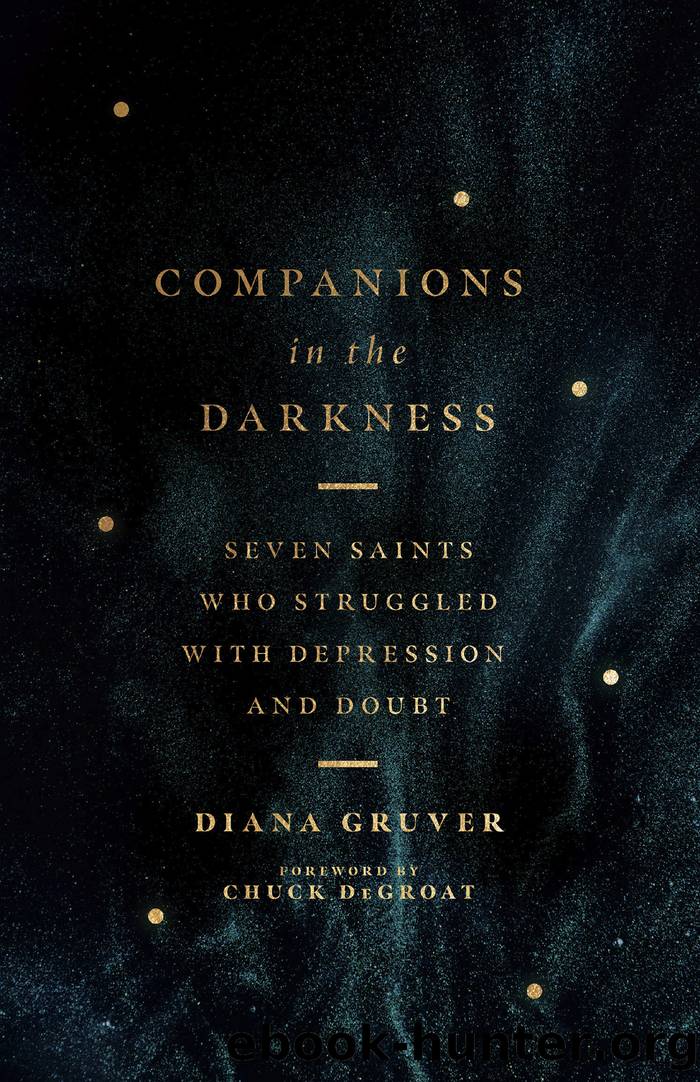Companions in the Darkness by Diana Gruver

Author:Diana Gruver
Language: eng
Format: epub
Tags: depression;mental illness;church history;martin luther;hannah allen;david brainerd;mother teresa;martin luther king, jr.;charles spurgeon;william cowper;Christians with depression;depression throughout history;depression in saints;depressed saints;depressed Christian;depression for Christians;depression and the church
Publisher: InterVarsity Press
Published: 2020-09-16T08:25:42+00:00
DUNGEONS OF DESPAIR: SLANDER AND CATASTROPHE
When Spurgeonâs deacons carried him, only partially conscious, through a private exit that night, he was only twenty-two years old. He didnât see the seven bloodied corpses on the grass in front of the Surrey Gardens Music Hall or the other twenty-eight people carried to the hospital badly injured. He only heard later the account of those who had maliciously sounded a false alarm, of those who had fallen in the rush and been trampled underfoot.
Can you imagine the grief in the city that night? Can you imagine the realization that those people had come to hear you preachâthat the attack had happened on your watch?
Spurgeonâs critics did not spare him in the aftermath of the tragedy. They heaped slander and accusation on his sorrow, blaming him for the lives lost and injured. But this was not the first time heâd come under their harsh words.
Charles Spurgeon had come to London three years earlier, a fresh-faced, nineteen-year-old country boy with a bad haircut. In spite of his rustic manners and no formal theological training, he was a dynamic and dramatic preacher, passionate about the Word of God. Within two years, the two-hundred-member congregation of New Park Street Chapel exploded in size to the point that their building could not contain them. He would remain their pastor for nearly forty years.
He was not popular with everyone, though. He faced harsh criticism and slander in the papers. They misquoted him and attributed words to him heâd never uttered. Some doubted his salvation. Others compared his words âthat are smoother than butterâ to the deception of Satan.2 One critic called his sermons a âprostitution of the pulpit.â3 I have trouble discerning if these critics were jealous of his popularity, turned off by his unique style (which they called âbad tasteâ and âvulgar and theatricalâ), or giving their genuine estimation.4
It is clear that these attacks hurt Spurgeon keenly. When he was trying to preach the gospel and win souls for Christ, such blatant attacks on his character were agonizing. I canât help but remember that he was a tender young man, far from home and just learning his way in the world.
During these early years, when his new wife, Susannah, was trying to find a way to comfort him, she carefully printed Matthew 5:11-12 and hung it up in their bedroom. Every morning, as he dressed and walked from the room to begin his day, and every night, as he rested after another day of work, it greeted him: âBlessed are ye, when men shall revile you, and persecute you, and shall say all manner of evil against you falsely, for my sake. Rejoice, and be exceeding glad: for great is your reward in heaven: for so persecuted they the prophets which were before youâ (KJV).
In spite of the slander, Spurgeon now had a congregation in need of a space to hold their growing numbers. They began construction on a new, five-thousand-seat church, the Metropolitan Tabernacle, and while they waited, they rented spaces to hold the swelling crowds flocking to hear their sensational preacher.
Download
This site does not store any files on its server. We only index and link to content provided by other sites. Please contact the content providers to delete copyright contents if any and email us, we'll remove relevant links or contents immediately.
Winning the War in Your Mind by Craig Groeschel(540)
A World Ablaze by Craig Harline(505)
White Too Long by Robert P. Jones(469)
Beautiful Resistance: The Joy of Conviction in a Culture of Compromise by Jon Tyson(464)
The Mission by David W. Brown(459)
In the Reign of King John by Dan Jones(457)
History of the Church by Eusebius(455)
No More Christian Nice Guy by Paul Coughlin(430)
The Crusades: A History by Jonathan Riley-Smith(400)
Why Study History? by John Fea(387)
The Black Church by Henry Louis Gates Jr(372)
The Tale of the Tardy Oxcart (Swindoll Leadership Library) by Swindoll Charles R(370)
Three Messiahs : The Historical Judas the Galilean, the Revelatory Christ Jesus, and the Mythical Jesus of Nazareth (9781450259477) by Unterbrink Daniel T(367)
The History of Palestine by John Kitto(351)
A Spacious Life by Ashley Hales(346)
Assassination of a Saint by Eisenbrandt Matt(338)
Augustine of Canterbury by Robin Mackintosh;(322)
Border Lines: The Partition of Judaeo-Christianity (Divinations: Rereading Late Ancient Religion) by Daniel Boyarin(320)
The Zionist Bible (BibleWorld) by Masalha Nur(315)
